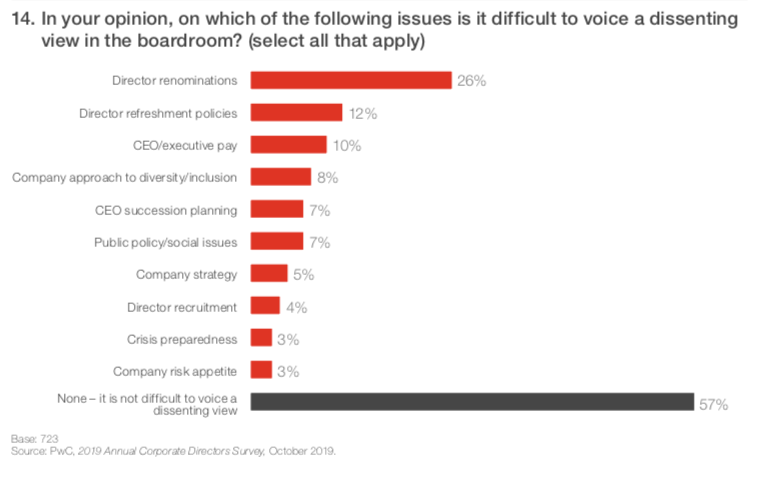Is your Board of Directors a place of open debate where dissenting views are heard and taken into account? Are their board members keeping quiet because they don’t feel they can speak up? These are challenging questions because we think of a Board as a collegial environment. But the quality of those decisions are undermined when members hold back. And, you might not even now it is happening.
Results from the PWC 2019 Annual Corporate Directors Survey
The PWC’s 2019 Annual Corporate Directors Survey found that 43% of directors (of public company boards) find it difficult to “voice a dissenting view.” And, this is from directors who are on boards representing very large businesses. The hardest think to voice a dissenting view was around director renominations and director refreshment policies. The result is under-performing directors continue on the board and needed new skills are not introduced into the board environment.

We can safely assume that the same challenges face boards in the not-for-profit sector. Not-for-profit boards are not immune to the human dynamics. There is a risk valuable insights will be lost If the board does not actively encourage all voices to be heard
Implications of Not Hearing Dissenting Views
We should not assume that just because it is a minority that finds it difficult to dissent, that the view does not matter. If the dissenting views are heard, other directors might be persuaded to rethink their position. It is a classic, group-think fallacy. Groups are always at risk of falling in love quickly with what seems like a sensible and smart decision. Dissent encouraged people to reflect.
For this reason, a critical element of the Board Self-Evaluation Tool is to ask specifically about whether there is open communication, meaningful participation. The question forms part of our meetings module that taps into the organization and dynamics of the interpersonal underpinnings of the board.
Board’s reach collective decisions and we expect the directors to support those decisions once made. If a board don’t hear all of the perspective, there is a significant risk that it makes decisions it later regrets. I think we could probably list a long list of questionable board decisions.
How confident are you that your board has a culture of free and open discussion. If you are at all concerned, this might be the time for a board self-evaluation that addresses this very question.


Recent Comments